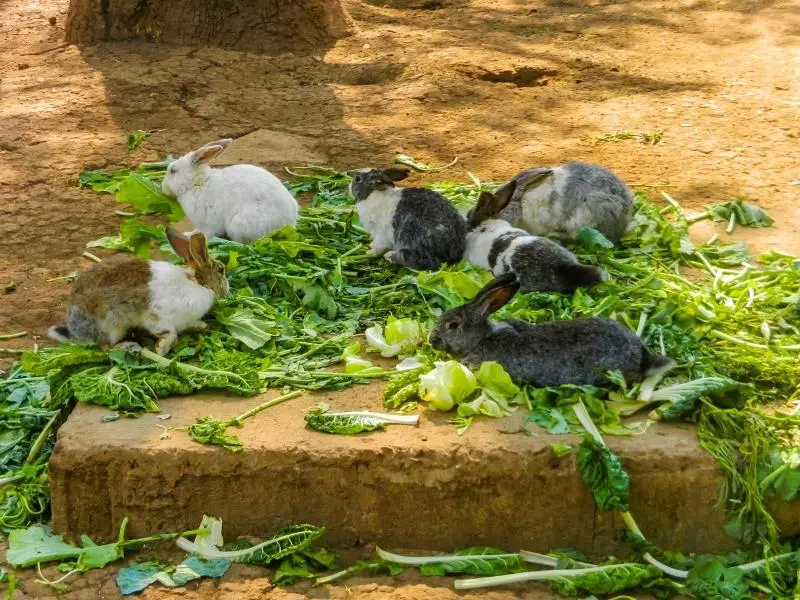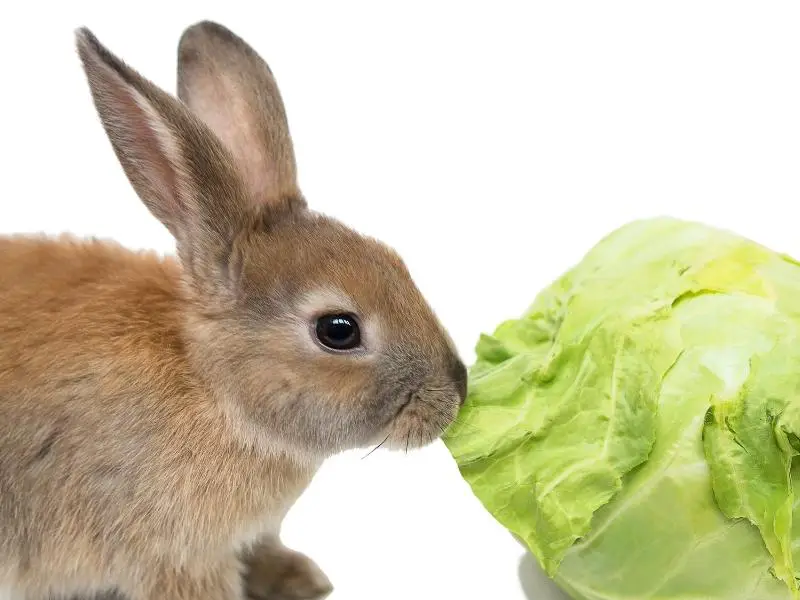Do you enjoy the crispy taste of cabbage, but you’ve realized it has some gassy side effects? Have you given your bun a few cabbage leaves, and now you’re worried they will experience the same effects as you?
Can rabbits eat cabbage?
Rabbits can eat cabbage occasionally and in small quantities. It’s a great addition to their diet and contains a nutritional value. However, when rabbits eat large amounts of cabbage, it causes unpleasant symptoms such as abdominal discomfort, bloating, diarrhea, and gas.
Are you looking for healthy and nutritious snack options for your bun, but you aren’t sure where to start? Then this detailed guide will provide you with all the information regarding the nutritional benefits and safety of feeding your floppy-eared friend cabbage.
Can Rabbits Eat Raw Cabbage?
As a bunny owner, you should only feed raw cabbage leaves to your rabbit.
Your bun is a herbivore (eats plants), and they need raw food to absorb any nutrients. Their stomach isn’t able to handle food that has been cooked, boiled, or pickled.
Giving your bun cooked cabbage has no nutritional value and can cause unwanted side effects such as:
- Bloating
- Gas
- Diarrhea
Don’t feed your bun leftover cooked cabbage from your dinner, as this most likely contains salt, which isn’t good for your bun.
Here’s a list of a few types of cabbage you can safely give to your rabbit:
- Savoy cabbage triggers less gas
- White cabbage is known to cause bloating so feed in moderation
- Red cabbage is full of potassium, which is good for pregnant does
Benefits of Feeding Cabbage to Rabbits

Cabbage is a great fresh vegetable option for a tasty snack. Let’s take a quick look at some of the benefits of feeding cabbage to your rabbit:
Source of Vitamin K
If you’re breeding rabbits, cabbage is an excellent option to feed your pregnant or breastfeeding does.
Cabbage has a high concentration of vitamin K, which is vital for a healthy pregnancy, as it helps with the clotting process of blood.
Source of Vitamin B6
By eating cabbage, your bun will get a healthy source of vitamin B6, which assists in breaking down protein in the body. This process is necessary to repair and build muscles.
Vitamin B6 is vital for maintaining good muscle function and boosting your bun’s immune system.
Good For Teeth
Another benefit of feeding cabbage to your bun is that it contains calcium. Rabbits have open-rooted teeth (teeth that never stop growing). Calcium keeps your bun’s teeth and bones strong, which is very important.
Chewing on crunchy, raw cabbage also helps to grind your bun’s teeth down. This prevents serious dental issues such as tooth elongation or malocclusion (poor positioning of teeth).
Source of Fiber
Cabbage contains a good amount of fiber, which keeps your bun’s gut flora healthy. As mentioned, rabbits are herbivores, and they need fiber to help keep their digestive system working correctly.
Your bun gets most of its fiber from the hay they eat. A diet low in fiber results in constipation and blockages, which can be fatal for a rabbit.
Source of Potassium
Your bun needs potassium to help regulate the amount of fluid in the body, which protects the heart and nervous system. Cabbage is a good, natural source of potassium.
Risks of Feeding Too Much Cabbage to Rabbits
Feeding too much of any vegetable to a rabbit poses health risks. Here’s a closer look at some of the risks of feeding too much cabbage to your floppy-eared friend:
Too Much Water
Water is good for rabbits. However, when they have too much it can cause gastrointestinal issues such as:
- Teeth grinding
- Hunched over in pain
- Vomiting
- Diarrhea or soft stool
Cabbage has very high water content, and overeating this crispy vegetable is not advised.
Bloating and Gas
A horrible side effect of consuming too much cabbage is the development of gas and bloating due to the fiber content. Rabbits are susceptible to gas build-up, which can be very painful for them and lead to death.
Symptoms of gas build-up include:
- Gurgling noises from your buns tummy
- Lethargy
- Your bun will lie still with its eyes slightly closed
Formation of a Goiter (Thyroid Enlargement)
Another nasty effect of overeating cabbage can result in the development of goiter in your bun.
Ingesting too many cruciferous (members of the mustard family) fresh vegetables affects a rabbit’s thyroid and reproductive organs.
How Much Cabbage Can I Give My Rabbit?
When introducing cabbage to your rabbit’s diet, it’s always best to start slowly and monitor the amount of cabbage you provide.
Giving your bun one leaf every second or third day is an excellent place to start. Once your bun is used to cabbage, they can have one-sixth of a cup of cabbage per pound of body weight, about 3 times a week.
Typically, a rabbit should only have a handful of fresh fruit or vegetables daily.
However, it would be best if you didn’t feed them cabbage daily as too much cabbage can lead to severe gas build-up. Rabbits receive most of their minerals and nutrients from hay and pellets in their diet.
Monitor your bun closely for any signs of digestive issues such as:
- Runny poop
- Bloating
- Constipation
- Sluggish behavior
If your bun shows any of these signs, you should stop feeding them cabbage immediately.
Can Baby Rabbits Eat Cabbage?
Baby rabbits can’t eat cabbage, primarily because of gas build-up and bloating. Your baby rabbits should only have their mother’s milk for the first 7 weeks.
By 6 months, the kits (baby rabbits) will start eating Timothy grass hay and leafy greens.
It’s vital to remember that a kit’s digestive system is still developing. It would be best if you only considered introducing cabbage to your kit’s diet by the end of their first year.
My Last Bunny Thoughts
Even though cabbage is an excellent option as a healthy snack for your bun, it can also cause more harm than good if your bun overeats cabbage. As a rabbit owner, you must ensure your bun gets a varied, balanced diet.
Feed your rabbits cabbage sparingly. Giving your bun savoy cabbages is one of the best options, as it’s very nutritious and triggers less gas. Check your bunny’s poop after they have eaten a helping of cabbage.
This will immediately indicate if your bun is reacting negatively to cabbage. Keep in mind that rabbits are picky eaters, and there is always a chance that they might not enjoy the taste of cabbage.
Related Articles:

